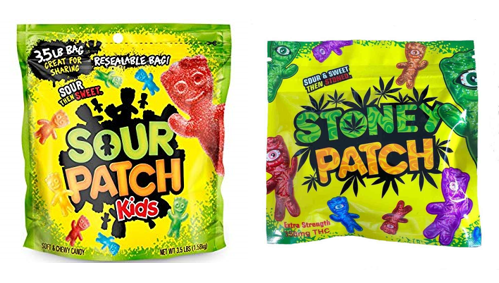Trademark Parody: Sour Patch Kids Sues Cannabis Brand to Protect IP

Sour Patch Kids-maker Mondelëz Canada Inc. (“MCI”) has filed a trademark lawsuit against a THC-infused gummies maker selling under the brand “Stoney Patch.” July 19, 2019, in the U.S. District Court for the Central District of California. Mondelëz Canada Inc. v. Stoney Patch, 2:19-cv-6245, was filed. This case is emblematic of the strategies that brand owners, particularly candy brand owners, are facing against copycat cannabis-infused edibles whose branding parodies well-established brands. Certainly, the challenge of enforcement against anonymous infringers is more sour than sweet.
In the complaint, MCI alleges that Stoney Patch’s company name, branding, and packaging are confusingly similar to MCI’s, and that such copycat antics are willful and intentional attempts to trade off of the goodwill and reputation of MCI. Such unauthorized use will cause consumer confusion and irreparable harm to its trademark rights and “worldwide reputation as a purveyor of high quality, family friendly snacks and candies.”
MCI has been marketing Sour Patch Kids candies in inherently distinctive packaging in the United States since 1985, and sells tens of millions of packages of the candies here each year. MCI has spent over $70 million in its advertising and promotional activities. MCI asserts that a result of these extensive advertising and promotional activities, the Sour Patch brand is famous, and is exclusively associated with MCI. MCI also raised concerns about Stoney Patch’s packaging and labeling, which, MCI argues, is targeted to children and is easily confused with MCI’s Sour Patch candies that are sold to children.
Based on the factual allegations, MCI asserts trademark and trade dress infringement, trademark dilution, and unfair competition claims. In addition to preventing Stoney Patch from using the Sour Patch trademarks and trade dress, and MCI seeks injunctive relief, destruction of infringing goods, monetary relief (including treble damages), and attorney’s fees and costs.
Not much is known about Stoney Patch, and MCI claims that Stoney Patch has taken deliberate measures to avoid detection by authorities. These include the absence of any company name or contact information on the packaging and the lack of a company website. The only known advertising is apparently through Instagram, but as of the date of this blog post, Stoney Patch appears to have removed all content from its Instagram page, @stoneypatchkids.
In light of Stoney Patch’s anonymity, MCI will have the challenge of serving the summons and complaint on a devious defendant. However, it may be that filing the complaint has achieved MCI’s main goal of shutting down Stoney Patch’s operations, which appear to have been conducted only through its, now seemingly defunct, Instagram account.
If you have any questions about trademark enforcement in the food and beverage or cannabis industries, please contact Danielle DeFilippis at dmdefilippis@norris-law.com or Jeanne Hamburg at jhamburg@norris-law.com.



